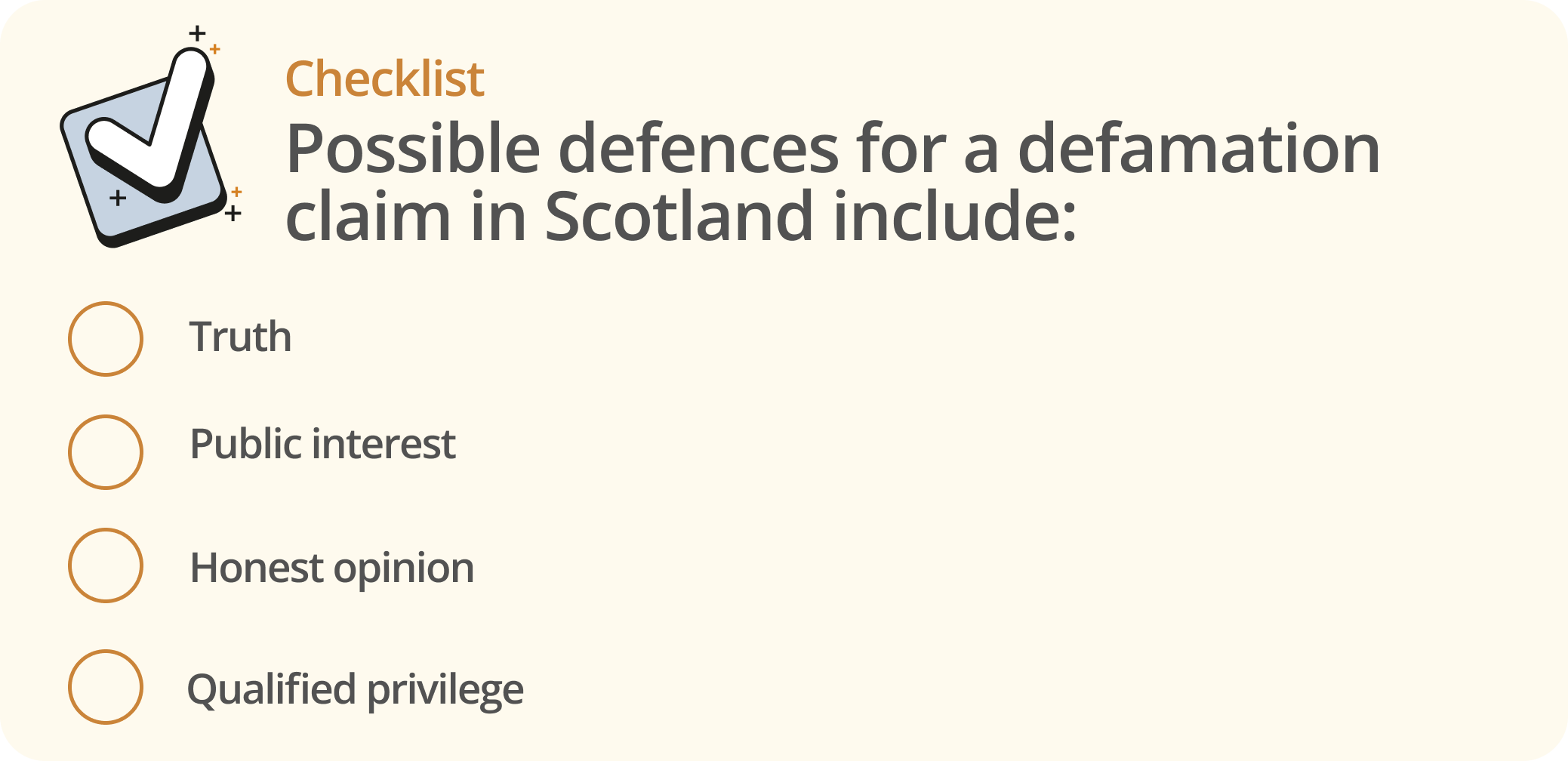What constitutes a defamatory statement? 
Defamation law in Scotland is governed by the Defamation and Malicious Publication (Scotland) Act 2021 (the Act). The Act defines ’defamation’ as publishing a statement that has caused, or is likely to cause, serious harm to the reputation of another. This is typically the case if the published statement lowers the person’s reputation in the estimation of ordinary people.
For businesses, such harm would only be considered serious if it caused, or is likely to cause, serious financial loss.
While individuals and businesses can bring a claim for defamation, public bodies in Scotland cannot.
Publishing
The defamatory statement must be published to someone other than the defamed individual.

In Scotland, unlike in England and Wales, there is no distinction between libel (ie the publication of a defamatory statement in written or permanent form) and slander (ie non-permanent forms of expression of a defamatory statement). Instead, a statement will be ‘published’ when the recipient has seen or heard it.
What is a malicious publication?
Under the Act, an action can also be brought for malicious publications. Malicious publication covers material that is not defamatory but could harm business interests. Where there is a malicious publication, a claim can be brought on the grounds that:
-
a statement caused harm to business interests
-
a statement caused doubt to title to property
-
a statement criticised assets
To be successful, the pursuer (ie the person making the claim for defamation) generally needs to prove that a statement:
-
is known to be false or that it is recklessly indifferent to the truth, and
-
was made maliciously
For malicious publications, there typically isn’t a need to show a financial loss if the statement complained of is more likely than not to cause loss.
What are the defences to a defamation claim?

The defences to a defamation claim in Scotland are:
-
truth - the statement is true or substantially true
-
public interest - regardless if the statement is a fact or opinion
-
honest opinion - the defamation was an honest opinion that is based on evidence and the court must determine that an honest person could hold the opinion from the statement based on any part of the evidence. If the defender did not genuinely hold the opinion from the statement then the defence fails
-
qualified privilege - certain situations in which an otherwise defamatory statement is made, will preclude claims from being brought (eg in peer-reviewed academic writing)
Who can be held responsible for defamation?
Proceedings can be brought against the:
-
author
-
editor
-
publisher of the statement
-
employee of such a person responsible for the statement’s content and/or the decision to publish it
A person is not an editor, employee or agent responsible for the publication of the decision of the content if they were merely providing a means to access a statement without altering the statement. By solely providing a means to access the statement, the person’s interest in, approval of or disapproval of the statement. For example, hosting the content as a service or providing a link would not make an individual responsible.
For someone who provides a means to access the statement, their involvement must not materially increase the harm caused by the publication of the statement. For example, ‘liking’ a potentially defamatory statement on social media would not generally attract liability (unless doing so materially increases the harm caused by the statement). However, ‘sharing’ a potentially defamatory statement written by a third party on social media may attract liability, especially where doing so materially increases the harm caused by the statement
What is the time limit for bringing a claim?
A claim for defamation and malicious publication must be brought within one year of the defamatory statement being made.
The time limit is generally deemed to run from the date of first publication, regardless of whether the statement is re-published later. However, the courts may reset the time limit if they determine that the manner in which the statement was re-published is materially different from the manner of the first publication. In deciding this, the courts may take into account:
-
the prominence the statement is given
-
the extent of the re-publishing, and
-
any other matters the courts consider relevant
Defamation is a very complex area of law and cases can take a year or more to complete. Ask a lawyer who will be able to discuss the merits of your potential claim and guide you through the legal hurdles.



